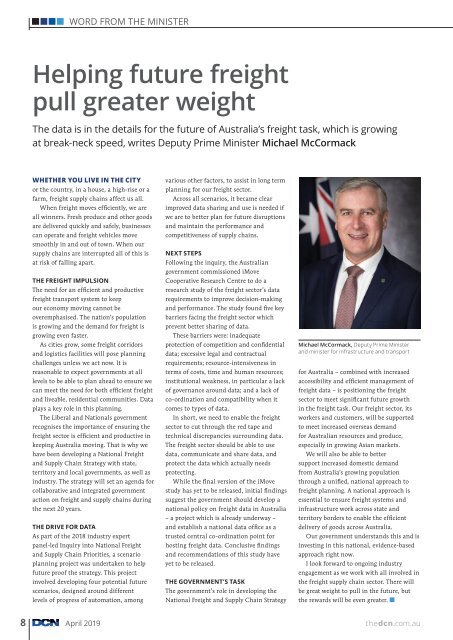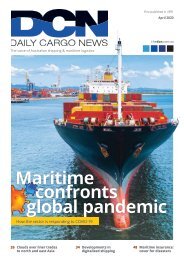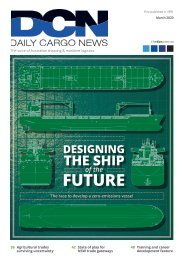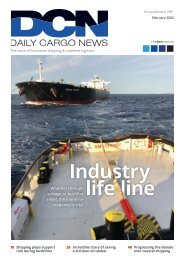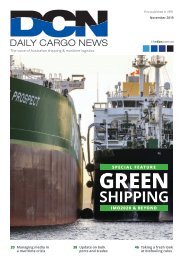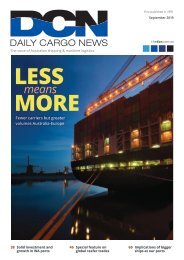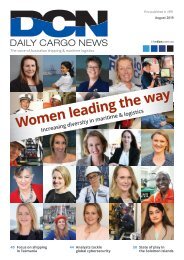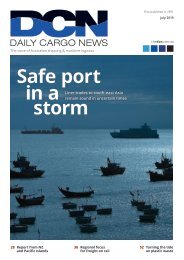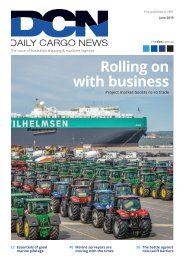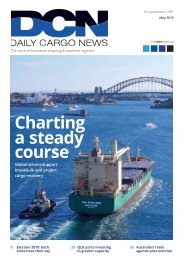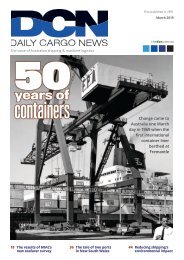DCN April 2019 Edition
Create successful ePaper yourself
Turn your PDF publications into a flip-book with our unique Google optimized e-Paper software.
WORD FROM THE MINISTER<br />
Helping future freight<br />
pull greater weight<br />
The data is in the details for the future of Australia’s freight task, which is growing<br />
at break-neck speed, writes Deputy Prime Minister Michael McCormack<br />
WHETHER YOU LIVE IN THE CITY<br />
or the country, in a house, a high-rise or a<br />
farm, freight supply chains affect us all.<br />
When freight moves efficiently, we are<br />
all winners. Fresh produce and other goods<br />
are delivered quickly and safely, businesses<br />
can operate and freight vehicles move<br />
smoothly in and out of town. When our<br />
supply chains are interrupted all of this is<br />
at risk of falling apart.<br />
THE FREIGHT IMPULSION<br />
The need for an efficient and productive<br />
freight transport system to keep<br />
our economy moving cannot be<br />
overemphasised. The nation’s population<br />
is growing and the demand for freight is<br />
growing even faster.<br />
As cities grow, some freight corridors<br />
and logistics facilities will pose planning<br />
challenges unless we act now. It is<br />
reasonable to expect governments at all<br />
levels to be able to plan ahead to ensure we<br />
can meet the need for both efficient freight<br />
and liveable, residential communities. Data<br />
plays a key role in this planning.<br />
The Liberal and Nationals government<br />
recognises the importance of ensuring the<br />
freight sector is efficient and productive in<br />
keeping Australia moving. That is why we<br />
have been developing a National Freight<br />
and Supply Chain Strategy with state,<br />
territory and local governments, as well as<br />
industry. The strategy will set an agenda for<br />
collaborative and integrated government<br />
action on freight and supply chains during<br />
the next 20 years.<br />
THE DRIVE FOR DATA<br />
As part of the 2018 industry expert<br />
panel-led Inquiry into National Freight<br />
and Supply Chain Priorities, a scenario<br />
planning project was undertaken to help<br />
future proof the strategy. This project<br />
involved developing four potential future<br />
scenarios, designed around different<br />
levels of progress of automation, among<br />
various other factors, to assist in long term<br />
planning for our freight sector.<br />
Across all scenarios, it became clear<br />
improved data sharing and use is needed if<br />
we are to better plan for future disruptions<br />
and maintain the performance and<br />
competitiveness of supply chains.<br />
NEXT STEPS<br />
Following the inquiry, the Australian<br />
government commissioned iMove<br />
Cooperative Research Centre to do a<br />
research study of the freight sector’s data<br />
requirements to improve decision-making<br />
and performance. The study found five key<br />
barriers facing the freight sector which<br />
prevent better sharing of data.<br />
These barriers were: inadequate<br />
protection of competition and confidential<br />
data; excessive legal and contractual<br />
requirements; resource-intensiveness in<br />
terms of costs, time and human resources;<br />
institutional weakness, in particular a lack<br />
of governance around data; and a lack of<br />
co-ordination and compatibility when it<br />
comes to types of data.<br />
In short, we need to enable the freight<br />
sector to cut through the red tape and<br />
technical discrepancies surrounding data.<br />
The freight sector should be able to use<br />
data, communicate and share data, and<br />
protect the data which actually needs<br />
protecting.<br />
While the final version of the iMove<br />
study has yet to be released, initial findings<br />
suggest the government should develop a<br />
national policy on freight data in Australia<br />
– a project which is already underway –<br />
and establish a national data office as a<br />
trusted central co-ordination point for<br />
hosting freight data. Conclusive findings<br />
and recommendations of this study have<br />
yet to be released.<br />
THE GOVERNMENT’S TASK<br />
The government’s role in developing the<br />
National Freight and Supply Chain Strategy<br />
Michael McCormack, Deputy Prime Minister<br />
and minister for infrastructure and transport<br />
for Australia – combined with increased<br />
accessibility and efficient management of<br />
freight data – is positioning the freight<br />
sector to meet significant future growth<br />
in the freight task. Our freight sector, its<br />
workers and customers, will be supported<br />
to meet increased overseas demand<br />
for Australian resources and produce,<br />
especially in growing Asian markets.<br />
We will also be able to better<br />
support increased domestic demand<br />
from Australia’s growing population<br />
through a unified, national approach to<br />
freight planning. A national approach is<br />
essential to ensure freight systems and<br />
infrastructure work across state and<br />
territory borders to enable the efficient<br />
delivery of goods across Australia.<br />
Our government understands this and is<br />
investing in this national, evidence-based<br />
approach right now.<br />
I look forward to ongoing industry<br />
engagement as we work with all involved in<br />
the freight supply chain sector. There will<br />
be great weight to pull in the future, but<br />
the rewards will be even greater.<br />
8 <strong>April</strong> <strong>2019</strong><br />
thedcn.com.au


